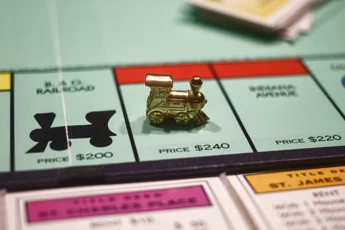 Written by: Danny Belton - Head of Lending
Written by: Danny Belton - Head of Lending
Whether you already have an interest-only mortgage or are considering taking one out, one of the biggest things you need to consider is how you're going to pay it off at the end of your term. Typically, people will use the sale of their property to pay for the outstanding balance, but there may be other options available.
For more details about how to pay off an interest-only mortgage, keep reading:
In this article:
What is an interest-only mortgage?
How long does it take to pay off an interest-only mortgage?
Your options for paying off an interest-only mortgage
Switching to a capital repayment mortgage
Can you pay off an interest-only mortgage?
Is it worth overpaying on an interest-only mortgage?
What is an interest-only mortgage?
An interest-only mortgage offers lower monthly payments compared to a traditional repayment mortgage. This is because the payments only cover the interest that builds up on the loan, not the actual loan amount itself. Because you are only paying for the interest, and the loan isn't repaid over time, you need to have a plan in place to pay the original loan in full.
Let's say you take out a £150,000 mortgage for 25 years. Each month, you'll pay the interest on this, which will be determined by the interest rate you're given. At the end of those 25 years, you will need to pay back the £150,000.
You can do this before the end of your mortgage term, but you must do it before your mortgage ends.
Here's everything you need to know about paying off an interest-only mortgage:
How long does it take to pay off an interest-only mortgage?
The term length you choose for this type of mortgage only dictates how long you have to make the interest-only payments. However, by the end of that term, you'll still owe the original loan amount in full. Since you won't be chipping away at the mortgage principal with your monthly payments, a crucial aspect of an interest-only mortgage is having a solid repayment vehicle in place at the end of the term.
When it comes to paying off an interest-only mortgage, here are some options you may want to consider.
Your options for paying off an interest-only mortgage
Selling your home isn't the only option when coming to the end of an interest-only mortgage term, but it is one of the most common. Let's go over the different routes you could take:
Selling your property
Selling your existing property is a popular option for many people with an interest-only mortgage, especially if your circumstances change. For example, if your children leave home or your mobility declines, downsizing to a smaller property can free up the capital to repay the original loan and potentially leave you with some leftover equity.
Switching to a capital repayment mortgage
If your initial repayment strategy no longer feels secure, you can explore switching to a capital repayment mortgage. With this option, your monthly payments cover both the interest and a portion of the principal loan amount. While the monthly payments will be higher than with an interest-only mortgage, you'll have peace of mind knowing you're steadily paying down the debt.
Utilising savings
A built-up lump sum in your savings or a maturing long-term savings plan can be a valuable resource for repaying all (or part) of your interest-only mortgage at the end of the term.
Pension lump sum
Some pension plans allow you to access a portion of the funds as a lump sum upon retirement. This could be used to clear some - or all - of your outstanding mortgage balance. Speak to a financial adviser and your mortgage adviser to determine whether this is right for you.
Equity release
This is an option to consider if your mortgage term is nearing its end and you lack a suitable alternative repayment strategy. Equity release involves borrowing money against the value of your property, which you would then use to pay off the remainder of the loan.
It's important to note that equity release schemes come with their own set of considerations, so seeking expert advice is crucial before proceeding.
Can you pay extra off an interest-only mortgage?
If you’re thinking about how to pay off an interest-only mortgage, it’s worth noting that many interest-only mortgages allow you to make overpayments on your loan. This can be done as a lump sum or through increased monthly instalments. Overpayments directly reduce the outstanding loan balance, making the final repayment amount smaller or potentially allowing you to pay it off entirely before the term ends.
When making overpayments, please be aware that you may have to pay an early repayment charge to your lender (if applicable).
Is it worth overpaying on an interest-only mortgage?
Even though an interest-only mortgage doesn't pay down the principal by itself, overpayments can be a powerful tool to help you achieve your goal of full repayment. Ultimately, the decision of whether or not to overpay on an interest-only mortgage is down to your individual financial circumstances. It's best to consult with a mortgage who can assess your situation and provide a solution that aligns closely with your needs.
What are the disadvantages of an interest-only mortgage?
While the monthly payments for an interest-only mortgage may be lower initially, you'll end up paying more interest in the long run because you're constantly paying interest on the entire loan amount. You’ll also need a solid plan to repay the entire loan amount at the end of the interest-only term.
Get expert advice
Regardless of whether you're considering taking out an interest-only mortgage or are nearing the end of your term, talk to a mortgage adviser.. They can assess your individual circumstances, recommend the most suitable mortgage product for your needs, and ensure you make this decision armed with all the information you need.
Get in touch with our expert mortgage advisers today to find out if an interest-only mortgage is a suitable option for you.
Important information
Your home may be repossessed if you do not keep up repayments on your mortgage.
There may be a fee for mortgage advice. The actual amount you pay will depend on your circumstances. The fee is up to 1% but a typical fee is 0.3% of the amount borrowed.
Frequently asked question
For some, having an interest-only loan means you'll have access to more cash to cover extra costs or because you can't afford capital repayments and the interest. Remember, it's not a decision to make lightly. You'll need a way to pay the capital at the end of the term.
Many interest-only mortgages are taken by landlords because they don't necessarily want to keep the property at the end of the term. It also means fewer monthly outgoings and potentially higher profits.
Yes, in the same way as a traditional repayment mortgage, the property is yours under the condition that you repay the entire outstanding amount at the end of the term.
It depends on your financial circumstances and goals, so speak to a mortgage adviser for personal advice
You can change your interest-only mortgage to a repayment mortgage, but it will be a new mortgage application. This means you will need to prove that you can afford the new (higher) payments as well as go through the regular mortgage checks.
Some interest-only mortgage deals are on a fixed rate, so you will need to remortgage if you want to avoid your lenders standard variable rate.




